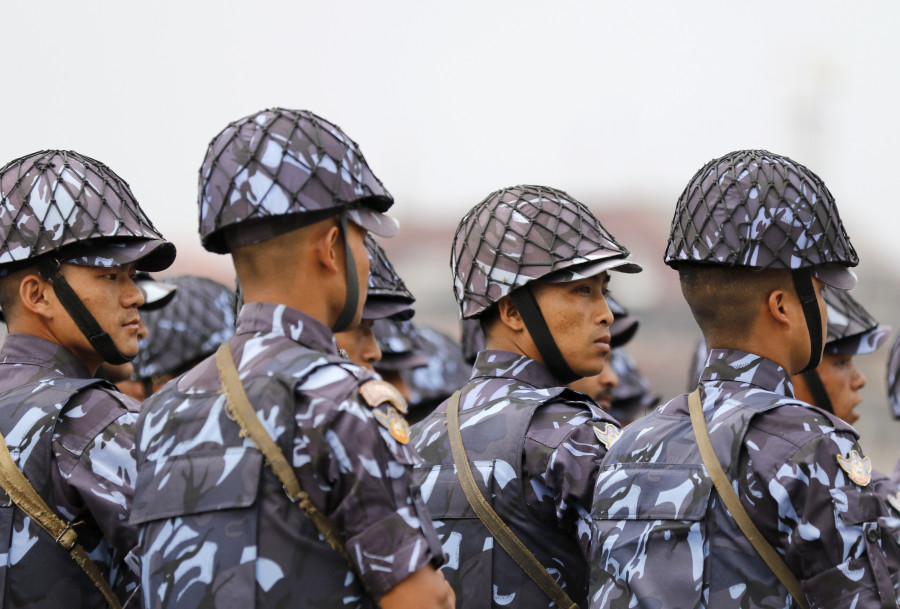Tue, Feb 17, 2026
Valley
Kathmandu, provinces at odds over security arrangements
When Province 2 went ahead with endorsing its Provincial Police Bill back in October last year, it created quite a furore at the Centre—so much so that former prime minister Pushpa Kamal Dahal, co-chairman of the governing Nepal Communist Party, went on to warn that any move to “overtake the Centre” would jeopardise republicanism.
bookmark
Tika R Pradhan
Published at : January 16, 2019
Updated at : January 16, 2019 20:35
Kathmandu
When Province 2 went ahead with endorsing its Provincial Police Bill back in October last year, it created quite a furore at the Centre—so much so that former prime minister Pushpa Kamal Dahal, co-chairman of the governing Nepal Communist Party, went on to warn that any move to “overtake the Centre” would jeopardise republicanism.
The objection to Province 2 move of bringing its own Provincial Police Bill emanated from the fact that the federal parliament was yet to introduce the umbrella law on management of police in the federal set-up.
The federal government finally registered the Police Bill in Parliament on Monday.
The bill says provincial governments can mobilise police personnel only up to the inspector level. The proposed bill, internal affairs ministers of the provinces say, violates the constitutional provisions that allow provincial governments to maintain law and order in respective provinces.
The federal government has prepared a draft of the Internal Peace and Security and Law and Order Bill, some provisions of which have again met with criticism from internal affairs ministers of the provinces.
A major bone of contention is the role a chief district officer will be playing when it comes to maintaining law and order and peace and security. A chief district officer, who is authorised to take decisions on issues related to peace, security and law and order, is part of a system of governance since the Panchayat days half a century ago.
Since the country has adopted federalism, provinces are demanding that there should be a new system in place for the mobilisation of police in provinces—and districts within.
Experts on federalism and its practices argue that the federal government’s reluctance to retain the chief district officers, who report to the federal Home Ministry in Singha Durbar, is reflective of the “centralised mindset” and defeats the whole purpose of devolution of powers, a fundamental concept of the new constitution.
The bill says security agencies in the districts should take instructions from the chief district officers, who would report to and receive instructions from the federal Home Ministry and provincial internal affairs ministries. This proposal puts chief district officers as the federal Home Ministry’s liaison, which experts say will make them more inclined to the Centre than the provincial governments.
Khimlal Devkota, an expert on federalism practices, dubs the federal government’s attitude is problematic. “All the authority of the chief district officers and police management should be given to the provinces. This will also lessen the burden of the federal government,” added Devkota. “The authorities at the Centre still seem to be working with the centralised mindset even though we have adopted federalism”.
Provinces have been demanding that it would be difficult to carry out security related works when the chief district officers report to the federal Home Ministry.
“Why do we need provincial governments if the Centre does not trust them?” asked Shalikram Jammarkattel, internal affairs minister of Province 3.
To make matters more complicated, the district administration offices, which are headed by the chief district officers, will have officials deputed by the Centre.
Internal affairs ministers of provincial governments have claimed that the Centre has been working in such a way that it could make federalism a complete failure.
Jammarkattel went on to say that provincial governments would be forced to appoint their own authorities in place of the CDO. “We [all provincial governments] will soon come up with a collective decision,” Jammarkattel said.
Dipendra Jha, chief attorney for the Province 2 government, said such moves of the federal government will dilute the concept of federalism.
“Earlier we had fought to usher in federalism; now another fight will be for its implementation,” he added, warning of moving the constitutional bench, if need be.
An official at the federal Home Ministry, who did not want to be named citing sensitivity of the issue, however, said: “This is just a draft on security related matters prepared after discussions with experts and stakeholders. It’s up to the lawmakers to include or exclude the provisions”.
Most Read from Valley
Editor's Picks
Upper house passes tourism bill with tougher Everest rules
What Routine of Nepal Banda gets right, and what it gets wrong
The murky business of room finding in Kathmandu
Nepal’s share market faces unprecedented lockdown as regulators battle industry over trading rules
Ministries differ over extending Indian HICDP aid beyond local governments
E-PAPER | February 17, 2026
×




 21.12°C Kathmandu
21.12°C Kathmandu












